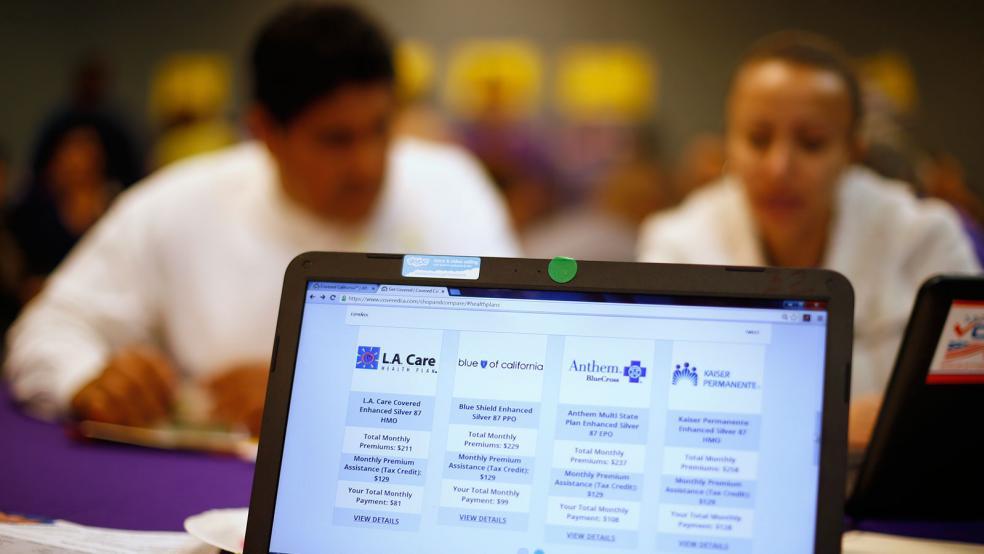The Affordable Care Act tends to rouse strong opinions in Americans, who remain divided on President Obama’s health-care overhaul.
No surprise, then, that the presidential candidates are also divided on the legislation, ranging from Republican candidate Ben Carson’s view that Obamacare is the worst thing since slavery to Democratic candidate Bernie Sanders’ support for universal health care, which Obamacare hasn’t achieved.
Related: 10 Worst Places to Live for Obamacare
While Obamacare is still relatively new, some early data and research is emerging that sheds light on how the overhaul so far has affected employers, workers and the economy. The impact hasn’t been nearly as dire as many critics feared – but there are also signs that Obamacare hasn’t yet lived up to the expectations of some supporters. Not surprisingly, Americans are split along partisan lines on the issue, with liberal Democrats more likely to support the law and conservative Republicans most likely to disapprove, according to the Pew Research Center.
Some mandates in the plan haven’t even kicked in yet, such as the requirement that employers with 50 to 99 employees provide health-care coverage to their workers, which will become effective on Jan. 1, 2016. Because of that, Obamacare’s impact on everything from the economy to the labor market will likely to continue to evolve.
Here are seven predictions about the health-care legislation that haven’t come true.
1. More than 20 million people would be enrolled in Obamacare. The Congressional Budget Office predicted in June that 20 million Americans would be using Obamacare to get insurance by the end of 2016, and earlier projections were even higher. However, the Obama administration recently announced that it expects about 10 million enrollees by the end of next year. Some health-care experts are worried about the program’s ability to attract and keep new participants.
Related: Nearly Half of Obamacare Co-Ops Are Closing
2. Obamacare would send the economy into a recession. Senator Ted Cruz (R-TX) warned that the law would bump the economy back into a recession, making “life harder for Texans and Americans all across our great country.” So far, the U.S. economy has avoided that fate and is continuing to strengthen, even though the recovery is not as robust as many Americans would like. Still, critics seized upon a Congressional Budget Office report earlier this year that forecast the economy would increase growth by 0.7 percent from 2021-25 if Obamacare were repealed, largely due to an increase in the labor supply. But the CBO also found a repeal would increase the net budget deficit by $137 billion over a decade.
3. Fewer Americans would have health insurance. In 2013, Senator Rand Paul (R-KY) forecast that fewer Americans would have health insurance “as they find out the insurance is so much more expensive than their current plan.” According to a May estimate from the Rand Corporation, 16.9 million people gained health care coverage in the first 18 months of its implementation, outpacing the 5.9 million people who lost coverage during the same period. The U.S. Department of Health and Human Services notes that about 16.4 million uninsured people have gained coverage, the largest reduction in four decades. Those people have gained health care through Obamacare’s health-care exchanges, Medicaid expansions and young adults who can now stay on their parents’ plans until they turn 26.
4. Obamacare would reduce the number of “underinsured” adults. Millions of Americans have insurance that is unaffordable, with out-of-pocket costs that are too high relative to their incomes. About 12 percent of Americans were underinsured in 2003, which means they faced medical expenses that claimed more than 10 percent of their household incomes. A study this year from the Commonwealth Fund found that about 23 percent of Americans with coverage are now underinsured. The result is that 31 million Americans who have insurance in 2015 will have trouble affording treatment under their policies.
Related: An Obamacare Change to Medicare Is Backfiring
5. Jobs would be lost as employers fired millions. The early data doesn’t support the fears from critics that employers would cut jobs and reduce hours, according to an October research paper from the Federal Reserve Bank of New York economist Maxim Pinkovskiy. After one year of implementation, “it appears very unlikely that the ACA substantially reduced employment in the areas that could expect to be most affected by it,” he wrote. Still, he cautioned that the long-term impact “remains to be seen.”
6. More Americans would retire or shift to part-time work. Some think tanks predicted that more Americans would retire earlier or cut back to part-time work, given that Obamacare would free them of the need to work full-time to gain insurance coverage. So far, that hasn’t played out, with recent research from the University of Michigan finding no evidence of either trend among Americans between 55 to 64 years old.
7. Americans families would have more time with their kids. Senator Chuck Schumer (D-NY) predicted in 2014 that the law would take some of the pressure off American families with parents working two or more jobs to pay for healthcare. “The single mom, who's raising three kids (and) has to keep a job because of healthcare, can now spend some time raising those kids. That's a family value,” he told NBC News. But overall, Americans worked longer hours last year, at 7.8 hours per day in 2014 versus 7.6 hours a day in 2008, when the recession began, according to the American Time Use survey. On top of that, families spent a few minutes less each day caring for kids last year than they did six years ago. That may be a response to stagnant wages and a rising cost of living, which isn’t giving families much breathing room, despite any impact from Obamacare.





